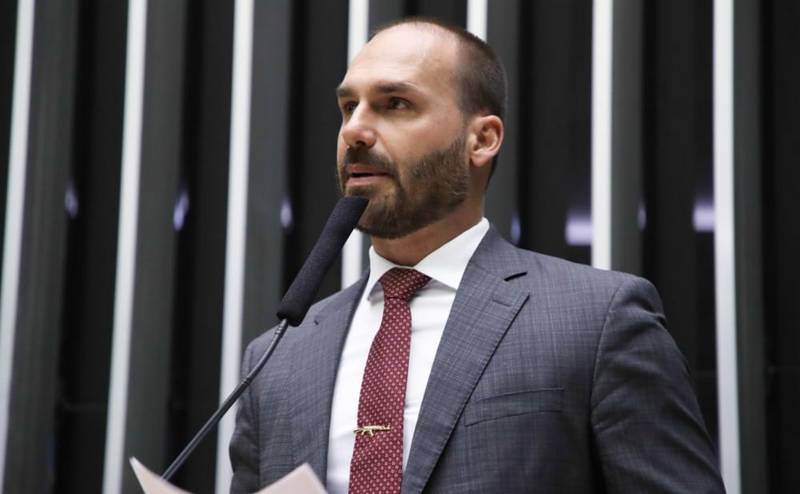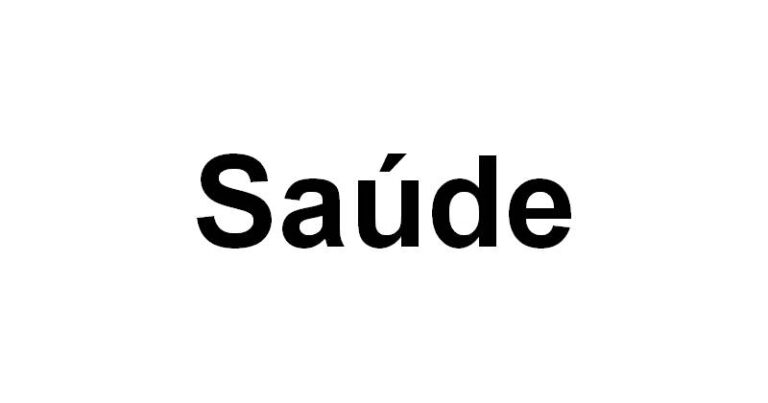
Eduardo Bolsonaro | Foto: Mario Agra / Câmara dos Deputados
[Foto: Arquivo / Mario Agra / Câmara dos Deputados]
Brazilian federal deputy Eduardo Bolsonaro, currently living in the United States, posted a statement on social media linking the recent partial reduction of U.S. tariffs on Brazilian products to domestic political factors in the United States. According to him, the decision was influenced by the need of former President Donald Trump’s administration to present economic results ahead of the 2026 midterm elections.
In his post, Bolsonaro referred to the so-called “Moraes tariff,” a term he uses to describe the 50% rate imposed by the United States on various Brazilian goods, arguing that it was a consequence of what he calls an “institutional crisis” allegedly caused by Brazilian Supreme Court Justice Alexandre de Moraes. He claimed that this situation has affected international confidence in Brazil.
Commenting on the partial tariff rollback announced by the United States, Bolsonaro stated that Brazilian diplomacy had no role in the decision. He argued that the move stemmed from internal economic needs in the U.S. In his text, he wrote that, with the 2026 midterm elections approaching, the Trump administration “needs quick results so that the population can feel inflation dropping before heading to the polls.”
The deputy also said that no country wants tariffs, as they affect exporters, and reiterated his view that legal instability in Brazil contributed to the adoption of the original tariff. In his publication, he defended the need to restore legal security and respect for freedoms, stating that without these conditions there would be no lasting growth or reliable international relations.
His statements reflect his position on the political and economic factors surrounding the U.S. decision and on the current institutional environment in Brazil.
Below is Eduardo Bolsonaro’s full post.
A tarifa-Moraes de 50% sobre a maioria dos produtos brasileiros é consequência direta da crise institucional causada pelo ministro Alexandre de Moraes, cujos abusos já preocupam o mundo e afetam a confiança internacional no Brasil.
— Eduardo Bolsonaro🇧🇷 (@BolsonaroSP) November 20, 2025
É preciso ser claro: a diplomacia brasileira… pic.twitter.com/Nqk09v3V49
“The ‘Moraes tariff’ of 50% on most Brazilian products is a direct consequence of the institutional crisis caused by Minister Alexandre de Moraes, whose abuses are already raising concerns around the world and undermining international confidence in Brazil.
Let’s be clear: Brazilian diplomacy had no role in today’s partial rollback of these tariffs. Just as it benefited other countries, the U.S. decision resulted solely from internal factors, especially the need to curb American inflation in sectors that rely on foreign inputs.
It is also important to note that, with the 2026 midterm elections approaching, the @realDonaldTrump administration needs quick results so that the population can feel inflation dropping before heading to the polls.
No foreign nation wants tariffs, as they hurt exporters, but the truth must be stated: it was the legal instability created by Alexandre de Moraes that paved the way for a 50% ‘Moraes tariff,’ harming Brazilian workers, producers, and business owners.
Brazil needs to restore legal security and respect for freedoms. Without that, there will be no growth and no reliable international relations“.
(Freely translated from a post by Eduardo Bolsonaro on X)
What does the Brazilian government say about this issue?
The Brazilian Ministry of Foreign Affairs released the following official statement regarding the removal of tariffs on Brazilian products imported by the United States:
“The Brazilian government received today (November 20), with satisfaction, the decision by the United States government to revoke the additional 40% tariff on a range of agricultural products imported from Brazil.
Several products will now be exempt from tariffs, including various types of meat, coffee, and multiple fruits (such as mango, coconut, açaí, and pineapple).
The Executive Order implementing the measure refers to the telephone conversation between President Lula and President Trump on October 6, during which they agreed to begin negotiations on the tariffs.
It further states that President Trump received recommendations from senior officials in his administration that certain agricultural imports from Brazil should no longer be subject to the 40% tariff due to the “initial progress in negotiations” with the Brazilian government.
The measure is retroactive to November 13, which coincides with the date of the most recent meeting between Minister Mauro Vieira and Secretary of State Marco Rubio in Washington, where they discussed ways to advance bilateral efforts toward reducing tariffs on Brazilian products.
The Brazilian government reaffirms its readiness to continue dialogue as a means of resolving issues between the two countries, in keeping with 201 years of excellent diplomatic relations.
Brazil will continue negotiations with the United States with a view to removing the additional tariffs on the remaining items in the bilateral trade agenda.”







